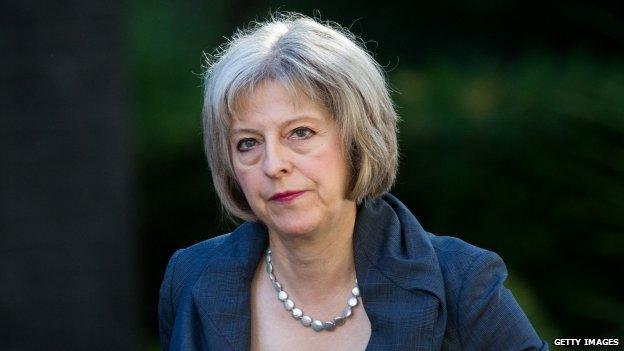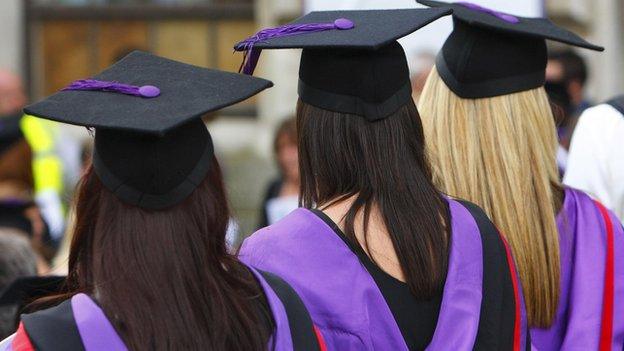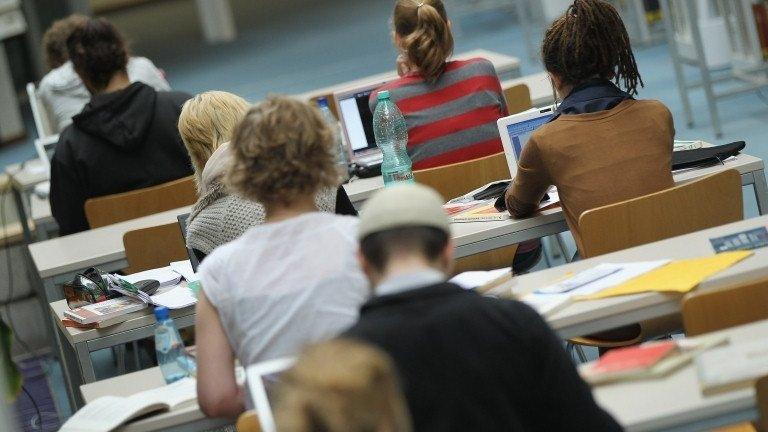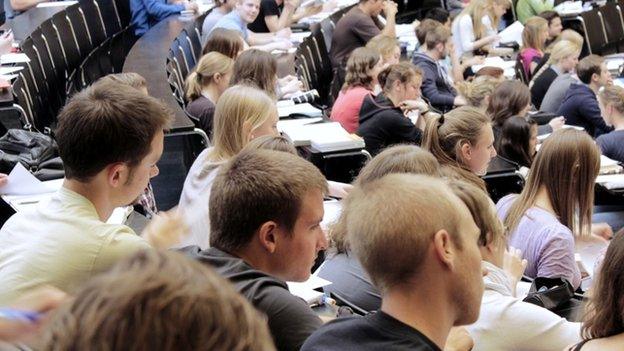Home Secretary proposes tougher rules for student visas
- Published
- comments

One proposal is that postgraduates' dependents should be stopped from doing less-skilled work
Home Secretary Theresa May is looking into tougher rules for visas for overseas university students, BBC Newsnight has learned.
The proposals would require students to have more financial savings on arrival.
In a confidential letter to other ministers, she argues that universities should "develop sustainable funding models that are not so dependent on international students".
The Home Office refuses to comment on leaked documents.
Student migration is a significant political problem for the government, which has a target of reducing net immigration to below 100,000 people per year.
Earlier this week, immigration minister James Brokenshire announced a tightening of immigration rules relating to non-EU students in further education.
'Write-round'
The government is some way off its immigration targets. At the last estimate, external, so-called "net migration" was running at 318,000 in the 12 months to December 2014. That was caused by gross immigration of 641,000 and gross emigration of 323,000. According to the International Passenger Survey, a total of 193,000 people came to the UK in 2014 for "formal study".
Theresa May's letter - a so-called Cabinet "write-round" sent between ministers - argues that students should be required to demonstrate a higher degree of financial backing as a condition for receipt of a higher education visa than is currently required. At the moment, they must demonstrate they have as much support as a British student could expect to receive from official sources.

Student migration is a significant political problem for the government
The document also proposes that postgraduates' dependents should be prevented from doing less-skilled work. This element of the letter, reported earlier this week by The Times, external, would affect up to 20,000 people who have visas as the dependents of students in the past year - as well as their student partners and families.
The concerns about "sustainable funding models that are not so dependent on international students" was in the context of worry about the multiplication of London "satellite campuses" for universities based elsewhere in the UK.
The letter says they have "quadrupled" in number in recent years. An official report published earlier this year believed that there were 13 of them.
Quality concerns
That investigation by the QAA, a higher education regulator, found: "The main reason was to increase the recruitment of international students who would be more attracted to London than to the home campus. Student numbers on these campuses range from under 100 to over 2000, with the average being 652 students".
The confidential letter from Ms May notes concern about the quality of these London centres which, it says, often offer non-STEM courses which are often quite different in character to the courses on offer at the home campus.
Under the coalition, Vince Cable, the Liberal Democrat business secretary, fought within Whitehall against immigration restrictions. Since May, Sajid Javid, his Conservative successor, has been less sympathetic to the academy.
So while universities have been cheered that the government wants to increase education exports to £30bn per annum by 2020, up from £18bn in 2012, they also worry that they lack strong enough allies within Whitehall to make sure that immigration laws do not restrict their work.
Universities make a large amount of money from overseas students. Higher education is considered a key element of Britain's export strategy. The Higher Education Funding Council for England, the sector funding body, estimates that English universities made £3.2bn from, external non-EU student fees in 2013-14. That constituted 12.9% of their £25.6bn of income in that year.
Abuse the focus
Home Office officials say they remain interested in cutting abuse, not numbers doing conventional study at reputable universities. The home secretary's letter contains an annex citing the websites and advertisements of companies and agencies seeking to help students to use student visa rights as a means of immigration.
One of those adverts offers help to people "looking for a public-funded college or universities that will allow you 10/20 hours work" and has a "qualified team of panel lawyers who can assist you in relation to your immigration matters".
Another asks "if you are worried your college has lost the [visa-sponsoring] license, and you are not finding any option with reliable education provider in UK to keep your status... if you want student visa that allow you to work... Please call us!"
The document also notes that 1.6% of visas sought by students at the research-intensive Russell Group universities were refused in 2014, compared with 4.7% at other universities. At public further education and other colleges, 8.4% of student visas were refused. At private colleges, that number rose to 12.9%. These are taken as indicators of where abuse is likely to be occurring.
Nicola Dandridge, chief executive of Universities UK, said: "Higher education is one of the UK's success stories, so it is vital that we present a welcoming environment for talented international students and staff. This is increasingly what our competitors are doing."
- Published21 December 2014

- Published2 April 2014

- Published19 March 2015
